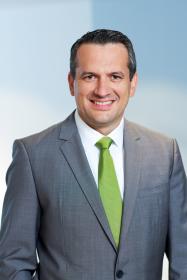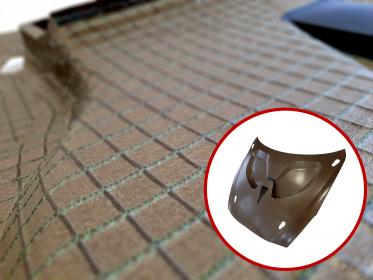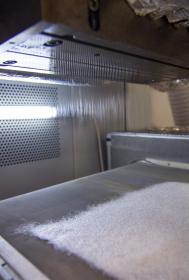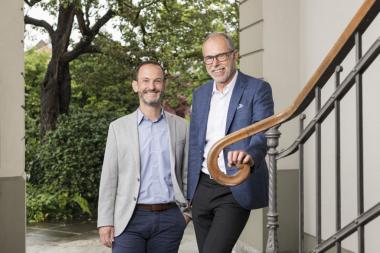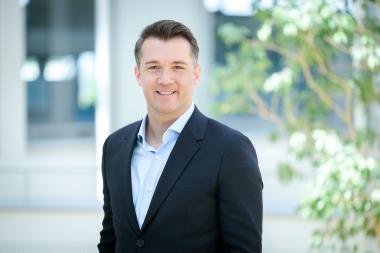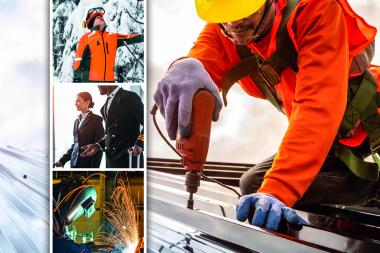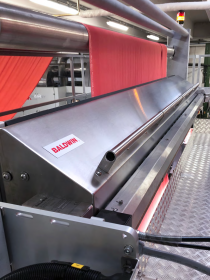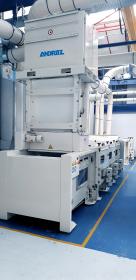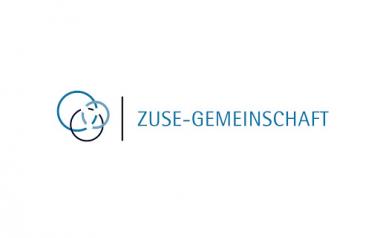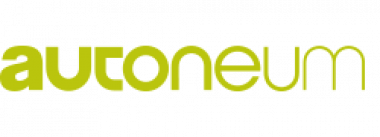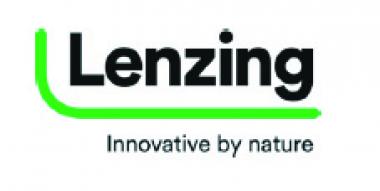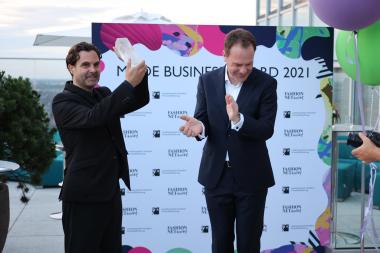GKD erweitert Angebot für die Glasvliesindustrie
- Prozessbänder für Imprägnierung und Trocknung aus einer Hand
In der Glasvliesproduktion setzen Trocknerbänder der GKD Gruppe weltweit Maßstäbe. Nahezu alle Hersteller vertrauen auf die Ebenheit und Querstabilität dieser Metallbänder. Mit der Erweiterung des Portfolios um Imprägnierbänder liefert GKD jetzt aus einer Hand Bänder für Kernprozesse in der Glasvliesfertigung.
Imprägnierbänder haben entscheidenden Einfluss auf die Effizienz des Produktionsprozesses und die Qualität des Endprodukts. Parameter wie Größe der Maschenöffnung, Anzahl der Auflagepunkte und Art der Gewebebindung tragen maßgeblich zum Prozesserfolg bei. Auf Basis von Marktumfragen entwickelte GKD für Imprägnierprozesse drei verschiedene Bandtypen. Mit ihren unterschiedlich großen Maschenöffnungen decken sie das gesamte Anforderungsspektrum ab: Type 1780 (8/6,1 Fäden pro Zentimeter), Type 1830 (9,2/7,5 Fäden pro Zentimeter) und Type 1865 (11/9 Fäden pro Zentimeter). In Abhängigkeit von der Kundenspezifikation bezüglich Länge und Stärke der eingesetzten Glasfasern, individueller Binderzusammensetzung, Prozess und Endprodukt wählt GKD aus diesem Spektrum gemeinsam mit dem Kunden das optimale Band aus.
Als geschätzter Lieferant von zuverlässigen Produkten und Services sowie kompetenter Ansprechpartner in Fragen der Anlagentechnik kennt GKD die Prozesse, Anlagen und Produkte nahezu aller Hersteller von Glasvliesen. Das hierdurch über Jahre gewachsene Vertrauensverhältnis paart der Weltmarktführer für technische Gewebe für Industrie und Architektur mit jahrzehntelang bewiesener Kompetenz im Bereich Kunststoff-Prozessbänder. Insbesondere in der anspruchsvollen Nonwovens-Fertigung gelten Kunststoffbänder von GKD als Garant für Effizienz und Produktqualität. Die neuen Imprägnierbänder von GKD für die Glasvliesherstellung aus prozessspezifisch modifiziertem Linear-Screen - auch als Leinenbindung bekannt - zeichnen sich durch exakt auf die jeweilige Anwendung abgestimmte Porengrößen und Luftdurchlässigkeit sowie durch eine stabile Kantenstruktur für eine sichere Randabtastung aus. Dank spezieller, prozessabhängiger thermischer Veredelung überzeugt ihre Gewebekonstruktion durch exzellente Laufeigenschaften. Die glatte Oberfläche gewährleistet überdies eine ebenso leichte wie schonende Produktablösung.
Lieferbar in allen gängigen Breitenklassen für Glasvliesanlagen mit Produktionsgeschwindigkeiten bis zu 450 Metern/Minute sind sie eine attraktive Alternative zu herkömmlich eingesetzten Bändern. Da GKD die Prozesse, Anlagen und Produkte der meisten Hersteller seit Jahren kennt und durch das Tochterunternehmen GKD USA auch auf dem Kernmarkt für Glasvliese in den USA kurze Lieferzeiten sicherstellt, haben Glasvlieshersteller weltweit nun eine attraktive Option: Bezug der erfolgskritischen Prozessbänder für Imprägnierung und Trocknung aus einer jahrelang bewährten Hand.
impetus.PR Agentur fuer Corporate Communications GmbH für GKD Gruppe






